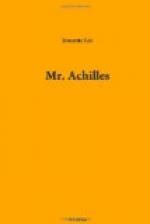beneath. Achilles was not thinking of the pursuit,
yelling behind him—he had no thoughts—only
two eyes that held a car far in the distance, and
two hands that gripped the wheel and drove hard, and
prayed grimly. If his eye lost that car!
It was turning now—far ahead and his eye
marked the place and held it—fixed.
His car jolted and bumped. Men swore and made
way before him, and noted the hatless head, and looked
behind—and saw the police car—and
yelled aloud. But no one saw him in time, and
he was not stopped. He had reached the corner
where the car disappeared from sight, and he leaned
forward, with careful turn, peering around the corner.
They were there—yes! He drove faster—and
the great, ugly car lifted itself and flung forward
and settled to long sliding gait. The car ahead
turned again in the whirling traffic—and
turned again. But Achilles’s eye did not
lose its track... and they were out in the open at
last—the plain stretching before them—no
turn to left or right—and the machine Achilles
drove had no equal in the country. But Achilles
did not know his machine. Good or bad, it must
serve him and keep his men in sight—but
not too near—not to frighten them!
They had turned now and were glancing back and they
spoke quickly. Then they looked again—at
the flying and hatless head—and saw suddenly,
on behind it, the service car leap softly around the
corner into the white road. They looked again—and
laughed. They turned and dropped the matter.
“Some damn fool with a stolen car.”
XXVI
AND RACES FOR THE CLUE
Under the great bowl of sky, in the midst of the plain,
the three cars held their level way—three
little racing dots in the big, clear place. They
kept an even course, swaying to the race on level wings
that swept the ground and rose to the low swale and
passed beyond. Only the long free line of dust
marked their flight under the sun.
The men at the front, in the car ahead, did not look
back again. They had lost interest in the race
pressing behind—most anxiously, they had
lost interest in it. They wished, with a fervent
wish, that the two cars driving behind them should
pass them in a swirl of dust—and pass on
out of sight—toward the far horizon line
that stretched the west. They were only two market
gardeners returning from business in the city.
If they drove a good car, it was to save time going
and coming—not to race with escaping fugitives
and excited police. They had no wish to race with
excited police—fervently they had no wish
for it—and they slackened speed a little,
drawing freer breath. Let the fellow pass them—and
his police with him—before they reached
a little, white, peaceful house that stood ahead on
the plain. They did not look behind at justice
pursuing its prey... they had lost all interest in
justice and in the race. Presently, when justice
should pass them, on full-spreading wing, they would
look up with casual glance, and note its flight over
the far line—out of sight in the distant
west. But now they did not know of its existence.




